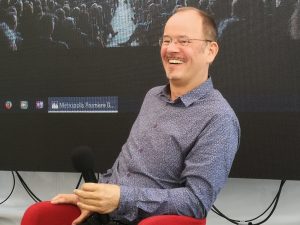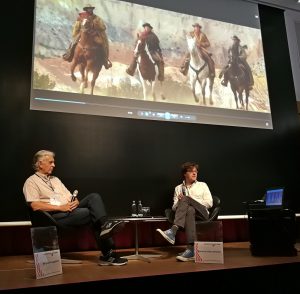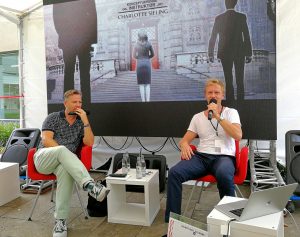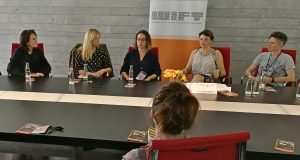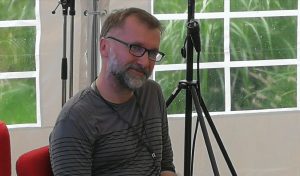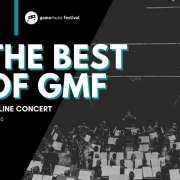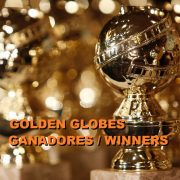SoundTrack_Cologne 14 – Summary
Last week, August 23-26, SoundTrack_Cologne was held in the German city of Cologne. Gorka Oteiza (SoundTrackFest) attended this event for the first time, and leaves us his summary in the following article.
Introduction
The core of SoundTrack_Cologne takes place over three very event-packed days; the first one dedicated to the music of videogames, the second dedicated to film music and the third one dedicated to TV music (besides the opening ceremony of the previous day, Wednesday 23rd of August).
The dynamics are very similar each day; every moment there are three or even four events happening simultaneously in different halls of the festival center, the Fritz Thyssen Stiftung, to which you can have access with the festival accreditation.
Following is a summary of those conferences / panels / meetings that could I attend.
THURSDAY 8/24 - VIDEO GAMES
Thursday 24 was a trip day for me, so unfortunately I could not be present in the conferences that took place throughout the day with composers Petri Alanko, Bobby Tahouri, Gareth Coker or Helge Borgarts about their experience composing music for video games. Simultaneously, there were many other interesting conferences such as those dedicated to music supervision by Robert Kraft, Andrea Läsig and Andreas Suttner or workshops for the presentation of tools used in music productions by the companies Orchestral Instruments, Steimberg, Spitfire Audio, Dear Reality or Galaxy Instruments. I’d like to highlight a workshop called “ASCAP & GEMA – The Rules of Game” with Jennifer Harmon (ASCAP – USA) and Jens Kindermann (GEMA – Europe) representing two important copyright management entities, that talked about the music licensing and the management of the royalties generated by them.
At night I went to the screening of a documentary within the film series called SEE THE SOUND, organized by SoundTrack_Cologne and that has as purpose to divulge films that deal with music and that are rarely premiered in theaters. The documentary in question was “Revolution of Sound. Tangerine Dream” that told the history of German band Tangerine Dream from its beginnings and foundation until today. Although the documentary started a little slow, it started to catch the rhythm and during 90 minutes offered a very interesting tour of the group’s history, its changes and its interaction with other artists, as well as its links with the cinematographic world.
FRIDAY 8/25 - FILM
Friday 25th was the big day, with a lot of events to attend besides an evening concert, being the first conference of the morning “Film Music Concerts: The Emperor’s new Clothes?” with Eleni Mitsiaki (Kinetophone & IFMCA), David Serong (Cinema Musica & IFMCA), Jörg Gerle (filmdienst) and composer / moderator Gregor Schwellenbach. It discussed the growing phenomenon of film music brought to the concert halls, both in a single concert format with / without images and in a bigger format into festivals, and the convenience of this trend where the music is dissociated from the images. Among many of the debates that emerged and the ideas discussed, almost all the participants agreed that the problem was not to separate the music from the image, but the program that was selected to make the concert, and the orchestral arrangements and adaptations that were carried out, that should give a meaning to music in that new medium.
Then the conference offered by the orchestra conductor Frank Strobel began, a very kind, open, and very energetic person, who spoke for half an hour of his beginnings as a projectionist of silent films, how the classic Metropolis film has been an important part of his life and career, and how he makes the synchronization of an orchestra work, both among its members as well as with the film being projected. After the conference, I had the opportunity to interview Frank Strobel for SoundTrackFest, where I dug deeper into some of the topics he had been discussing and presented new ones such as the requirements he believes an orchestra conductor should have to conduct film music compared to conducting classical music, or the rise of film music in the repertoires of orchestras and at concerts/festivals. A very interesting person, with very clear ideas and with a vast knowledge of the world of film music in concert.
In the afternoon, one of the most expected moments of the festival arrived; the conference offered by Bruce Broughton, where a moderator who did not know how to set the right tone for the panel, let the veteran and experienced composer save the day, filling the conference with many interesting details of his multiple works for cinema, television, video games or even theme parks. And rescuing a phrase that Bruce Broughton said during his lecture: “When you talk to directors / writers, you have to talk about telling a story, not about music.”
Almost without time to wait till the end of the conference, I had to leave for the WDR Funkhaus concert hall, since there at 6:00 pm began the final rehearsals of the WDR Funkhausorchester for the silent film concert of that night. We were a group of about 20 people there, who had been accredited to access the rehearsals. Once inside the venue we were placed at the back of the stage, on the sides, to get a complete view of the performance of the orchestra and the conducting skills of Frank Strobel, and to check many of the points he had talked about in his conference. This rehearsal, which lasted for about 1 hour, was actually a review of the critical points of the concert; points where the director felt that some minor corrections should be emphasized and applied. A very didactic and worthy experience, although unfortunately I missed all the details because the explanations to the orchestra were given only in German (something completely understandable, and in this case, something that couldn’t be done in any other way).
Shortly after, at 8:00 pm, started the concert of the film “Jeanne Ney – Eine Liebe” (“Jeanne Ney – One Love” – 1927) which featured the original music of Hans May rebuilt by composer Bernd Thewes, who was present in the hall; a hall that curiously was only half-full. After an introduction that was only in German, the film started with the beginning titles in complete silence, and when the first scene arrived, Frank Strobel raised the baton and with a precise and marked rhythmic gesture, started the musical machinery of the WDR Funkhausorchester.
The concert lasted nearly 2 hours, and the truth is that although the performance of the orchestra was very good (and even more delightful having seen the rehearsals and knowing the corrections that were applied in certain passages), the music was not adequate in many occasions and didn’t get the atmosphere of the story. A concert with a magnificent conducting and interpretation, but with a somehow inadequate music, that turned an evening that could be special into something quite regular.
And with this concert ended a new day, which had left us many other interesting things that I could not attend, such as the panels with composers Volker Bertelmann – Hauschka, Lesley Barber, Johnny Klimek, Beckmann, Tom Stöwer or the master class that was giving throughout the whole day Jeff Rona about the creation of music for video games, oriented mainly to composers.
SATURDAY 8/26 - TELEVISION
The end of SoundTrack_Cologne arrived Saturday 26th, with the last day dedicated to music on television. A pair of simultaneous first-hour lectures by composers Jeff Rona and Carly Paradis shared a time slot with the screening of short films that had music nominated for the European Talent Award.
In my case, it also coincided with the scheduled interview with legendary composer Bruce Broughton for SoundTrackFest, where he showed that his friendliness and closeness, were as great as his talent. We talked about his beginnings, his experiences in the world of television, his preference in composing for animation, his experience with the music for theme parks, and some of his concert works (one for a Tuba Congress and another one for Harp Congress precisely!). A fabulous interview, which like the one that I had with Frank Strobel, will be published in SoundTrackFest in the coming weeks.
But there was still time for another conference in the morning, the one moderated by Thomas Mikusz of White Bear PR starring Danish composer Halfdan E, where he told us about his television works, showing various fragments of main titles or key moments in the series, and explaining the work done and the creative decisions taken.
After a break for lunch, and sharing time with the “Peer-Raben Music Award” and composer Walter Mair‘s panel, it was time for the “Team Composing – Chances and Challenges” conference, where in cooperation with WIFTG – Women in Film and Television Germany, composers Lesley Barber, Carly Paradis, Tina Pepper and the music supervisor Sarah Bridge, explained their collaborative experiences in joint projects, offering advice and suggestions.
And last but not least, it was time for my last conference on SoundTrack_Cologne with composer Michael Price hosted by Matthias Hornschuh, where he talked about his work on series like Sherlock with David Arnold, Unforgotten or Jekyll & Hyde.
Later at night, the closing ceremony of the festival was held, with the awards ceremony in the center of it, which has already been explained in detail in the following monographic article (read Article). The gala was very well organized, agile, and it cleverly interspersed awards presentations, winning movie projections, and a couple of musical performances; one related to one of the awards and the other one related to the delivery of the Lifetime Achievement Award to Bruce Broughton, making the evening go very quickly and very pleasantly.
IN SUMMARY
Let’s have a list of points that could have some improvement and some strong points of SoundTrack_Cologne.
Improvement points:
- Language. The congress should try to have all the events in two languages or at least have a space always in English, so that both local and international audiences can understand what is going on (for example the presentation of the silent film concert or the inter-titles, were only in German, making difficult to follow the story).
Strong points:
- Having a festival center such as the Fritz Thyssen Stiftung where all the events were happening, is a very good idea, since being open from 9:00 am to 6:00 pm, it helped to have meetings with people, either in a planned or in an incidental way.
- Equipment. In the festival center, in addition to the conference rooms, there was a bar and meeting areas and work areas, so that you could spend all day in the place, entering and leaving the different panels / conferences at will (although I lacked some inside space better conditioned, office style, where to be able to stay with the laptop to write).
- The density of conferences at the event makes it often difficult to choose which one to attend, since there are several very interesting options going on simultaneously. This can be a good thing, as there is no time for boredom and the event is very productive, although it is true that somehow also plays as a contra, as it forces you to miss interesting moments.
In summary, SoundTrack_Cologne is an event very oriented to the professional audience, where the interaction between people working in the audiovisual music sector (tv/film/video-games) is very high, and where meeting people and making contacts is something very easy and common.
In contrast to other festivals / congresses / events where there is a mix of amateur and professional audiences, in SoundTrack_Cologne the majority of the participants are professionals of the sector: composers of consecrated career, young composers, sound editors, sound mixers, music supervisors, directors, publicists, producers, agents and so on.
So, whether you are a professional in the industry or a fan who wants to know the ins and outs of this world from different points of view, it is worth to attend SoundTrack_Cologne, as it is a congress organized in a very professional and highly productive way.
Before ending this article, here is a brief video that summarizes some of the many good moments that took place throughout the congress.
SoundTrack_Cologne will come back 22-25 of August 2018 with its 15th edition. Mark the dates on your calendar!
Gorka Oteiza (SoundTrackFest)



